|
|
|
Sort Order |
|
|
|
Items / Page
|
|
|
|
|
|
|
| Srl | Item |
| 1 |
ID:
108003
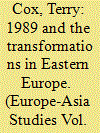

|
|
|
| 2 |
ID:
105694


|
|
|
| 3 |
ID:
044809


|
|
|
|
|
| Publication |
London, Frances Pinter (Publishers) limited, 1983.
|
| Description |
xviii, 457p.hbk
|
| Series |
CSIS Publication Series on the Soviet Union in the 1980s
|
| Standard Number |
0861873386
|
|
|
|
|
|
|
|
|
|
|
|
Copies: C:1/I:0,R:0,Q:0
Circulation
| Accession# | Call# | Current Location | Status | Policy | Location |
| 030827 | 947.0853/BYR 030827 | Main | On Shelf | General | |
|
|
|
|
| 4 |
ID:
108014
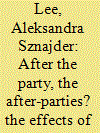

|
|
|
| 5 |
ID:
123195
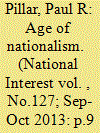

|
|
|
|
|
| Publication |
2013.
|
| Summary/Abstract |
THE URGE to apply era-defining labels to global affairs is strong and enduring. A label and a few easy-to-understand attributes associated with it can impart a reassuring simplicity to what is actually a complex and often-intractable reality. While the disadvantages of era labeling, including oversimplification, are probably as great as the advantages, the practice is here to stay.
|
|
|
|
|
|
|
|
|
|
|
|
|
|
|
|
| 6 |
ID:
124336
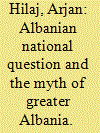

|
|
|
|
|
| Publication |
2013.
|
| Summary/Abstract |
To know what the Albanian National Question (ANQ) is, one should learn it not from what its neighbors, namely Serbia and Greece, have to say, but from a more direct and reliable source, the voice of the Albanians themselves. No nation is in a position in which it can express in a realistic way the needs, rights and aspirations of a different nation in the same way as an individual cannot be an exact representative for anyone but himself. For many years the Western countries used to rely on either Serbian or Greek lenses for the ANQ. In the late 1990s the U.S.-led intervention against Serbia over Kosovo on humanitarian grounds and the Albanian insurgency in Macedonia has contributed to an altered power balance in the region. The neighbors frightened by the power shift in the Southern Balkans use their propaganda machinery to express the danger posed by the alleged Greater Albania scheme in order to demonize and morally downgrade the ANQ. However, one can easily see that Albanians since the creation of their state have not, are not, and will not pursue an irredentist agenda toward their neighbors.
|
|
|
|
|
|
|
|
|
|
|
|
|
|
|
|
| 7 |
ID:
138691
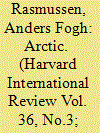

|
|
|
|
|
| Summary/Abstract |
It is unique for its climate and geography: for natural phenomena such as the midnight sun and the Northern Lights, as well as the creatures and the cultures which have evolved there. Throughout human history, it has been viewed with reverence as a special and mysterious place where unique rules apply. However, global warming has begun to reveal the secrets of the Arctic, lifting the shroud of ice, which has veiled the region for millennia, and opening it to ever-greater traffic.
|
|
|
|
|
|
|
|
|
|
|
|
|
|
|
|
| 8 |
ID:
128987
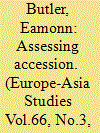

|
|
|
|
|
| Publication |
2014.
|
| Summary/Abstract |
On 1 May 2014, the European Union (EU) celebrated the tenth anniversary of the accession of ten member states-Cyprus, Czech Republic, Estonia, Hungary, Latvia, Lithuania, Malta, Poland, Slovakia and Slovenia. Of these ten new members, eight were Central and East European (CEE) countries that had, for most of the twentieth century, been governed by communist regimes either as republics of the Soviet Union (Latvia, Lithuania and Estonia), satellite states of the Soviet Union (Poland, Hungary, Czech Republic, Slovakia) or as a constituent republic of Yugoslavia (Slovenia). In the subsequent ten years three additional post-communist countries have acceded to the EU (Romania and Bulgaria in 2007 and Croatia in 2013). Commenting on the 2004 EU accession of the first eight former communist countries, the then Irish Prime Minister and President of the European Council, Bertie Ahern, wrote that there was
a particular historical resonance as eight of the former communist countries in the east have emerged from the shadows of the Iron Curtain to join us in working for common goals and for mutual benefit. The artificial divisions, which have blighted our continent's history for so long, are finally being laid to rest.1
|
|
|
|
|
|
|
|
|
|
|
|
|
|
|
|
| 9 |
ID:
140557
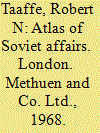

|
|
|
|
|
| Publication |
London, Methuen and co. ltd., 1968.
|
| Description |
x, 143p.pbk
|
| Standard Number |
416948804
|
|
|
|
|
|
|
|
|
|
|
|
Copies: C:1/I:0,R:0,Q:0
Circulation
| Accession# | Call# | Current Location | Status | Policy | Location |
| 001840 | 911.47/TAA 001840 | Main | On Shelf | General | |
|
|
|
|
| 10 |
ID:
030595


|
|
|
|
|
| Edition |
8th ed.
|
| Publication |
London, Methuen and Co. Ltd, 1987.
|
| Description |
216p.;mapsHbk
|
| Contents |
Includes Index.
|
| Standard Number |
0416011721
|
|
|
|
|
|
|
|
|
|
|
|
Copies: C:1/I:0,R:0,Q:0
Circulation
| Accession# | Call# | Current Location | Status | Policy | Location |
| 028281 | 911/BOY 028281 | Main | On Shelf | General | |
|
|
|
|
| 11 |
ID:
132083
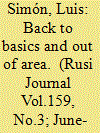

|
|
|
|
|
| Publication |
2014.
|
| Summary/Abstract |
As Allied combat forces return from Afghanistan, Russia's annexation of Crimea has reminded NATO that the security of a rules-based international system in Europe cannot be taken for granted. Efforts to reassure Allies and partners in Eastern Europe have thus become a top priority. This, however, should not lead the Allies to turn their backs on broader, global geostrategic developments - particularly at a time when Asia is emerging as the world's economic and geopolitical centre of gravity. If the West is to prosper in a changing world, argues Luis Simón, it should be able to both defend Europe and project security globally.
|
|
|
|
|
|
|
|
|
|
|
|
|
|
|
|
| 12 |
ID:
132897
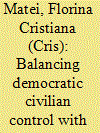

|
|
|
|
|
| Publication |
2014.
|
| Summary/Abstract |
This article reviews Romania's intelligence reform after 1989. Specifically, it looks at intelligence reform before and after Romania's accession to the North Atlantic Treaty Organization (NATO) in 2004, and the European Union (EU) in 2007. It finds that Romania has made considerable progress in intelligence reform. That is because Romania, which expressed its desire and commitment to join NATO/EU after 1989, has worked hard to comply with these organizations' membership demands (including intelligence reform). After NATO/EU integration (when demands on balancing control and effectiveness virtually vanished), despite continued openness efforts made by agencies, control/oversight diluted. Thus, post-NATO/EU, while effectiveness is being strengthened, democratic control lessens.
|
|
|
|
|
|
|
|
|
|
|
|
|
|
|
|
| 13 |
ID:
147150
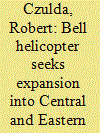

|
|
|
| 14 |
ID:
119724
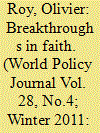

|
|
|
|
|
| Publication |
2011.
|
| Summary/Abstract |
Florence-Faith made a sudden breakthrough into contemporary global politics with the 1979 Islamic Revolution in Iran. From the Taliban to al-Qaida, the following three decades have been full of international tensions where faith was a leading factor, but this unease has by no means been restricted to the Muslim world. The Catholic Church found a new visibility under the leadership of John Paul II, shaking the communist grasp on Eastern Europe. Millions of converts from Catholicism to Protestantism are reshaping domestic politics in Brazil and other Latin America countries. Conversions from Islam to Christianity have created diplomatic hurdles in Malaysia and Afghanistan, while foreign missionary activities came under state scrutiny in India, Russia, and France. The Falun Gong sect waged an international campaign to pressure the Chinese government to remove a ban on the group. The affairs of Salman Rushdie and the Danish cartoons seemed to pit the Muslim world against the West, while the rise of Islam in Europe has raised anxieties in the United States and Israel, with the spectre of a looming Eurabia haunting urban neighborhoods and diplomatic corridors alike.
|
|
|
|
|
|
|
|
|
|
|
|
|
|
|
|
| 15 |
ID:
107059
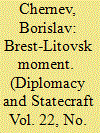

|
|
|
|
|
| Publication |
2011.
|
| Summary/Abstract |
The article argues that the historical origins of the concept of self-determination had less to do with Woodrow Wilson than with the specific circumstances during the last phase of the Great War. It argues that self-determination became the "centre of the discourse of legitimacy in international relations" as a result of a dynamic process involving multiple actors. Lenin and the Bolsheviks first started to employ the concept. Self-determination discourse gained further momentum during the Brest-Litovsk peace conference, where the Austro-German and Russian delegations debated its application at some length. This prompted Allied statesmen to crystallise their ideas and make self-determination their principal war aim. The increasing appeal of self-determination first manifested itself in the entangled spaces of Eastern Europe, where the national aspirations of Poles and Ukrainians, bolstered by the new discourse, converged with the rhetoric emanating from Brest-Litovsk to create a "Wilsonian moment" before Wilson.
|
|
|
|
|
|
|
|
|
|
|
|
|
|
|
|
| 16 |
ID:
133418
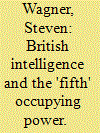

|
|
|
|
|
| Publication |
2014.
|
| Summary/Abstract |
At the end of the Second World War, British intelligence struggled to enforce strict limits imposed on Jewish immigration to Palestine. Holocaust survivors and Jews wishing to escape communism in Eastern Europe flooded the western Zones of occupation in Germany and Austria, while the Zionist movement worked to bring them to Palestine. Illegal immigration to Palestine was the key policy dispute between Britain and the Zionist movement, and a focus for British intelligence. Britain sought both overt and covert means to prevent the boarding of ships at European ports which were destined for Palestine, and even to prevent the entry of Jewish refugees into the American zones. This article highlights Britain's secret intelligence-gathering efforts as well as its covert action aimed to prevent this movement. It highlights a peculiar episode in the 'special relationship' between Britain and the United States, during which cooperation and partnership was lacking. British intelligence promoted a rumour that Soviet agents were using Jewish escape lines to penetrate Western Europe and the Middle East in order to persuade American authorities to prevent the movement of Jewish refugees. Instead, this article argues, American intelligence secretly cooperated with the Zionist organizers of the escape routes so to expose Soviet agents. Britain's attempt at deception backfired, and provided effective cover for the movement of hundreds of thousands of Jews during a critical period. Meanwhile its intelligence had dramatically improved, but policymakers failed to reassess Britain's ability to sustain immigration restrictions and the indefinite detention of tens of thousands of illegal migrants.
|
|
|
|
|
|
|
|
|
|
|
|
|
|
|
|
| 17 |
ID:
133578
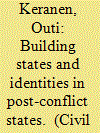

|
|
|
|
|
| Publication |
2014.
|
| Summary/Abstract |
An integral part of state formation processes is identity-building: 'making one out of many' as Walzer puts it. This is also true in terms of contemporary, internationally led statebuilding projects. This dimension of international statebuilding is important, as fundamental questions pertaining to belonging are as important to successful post-conflict process as institutional arrangements; in fact, assumptions about identities and group boundaries guide the technical decisions on institutional and governance structures. The central aim of this paper is to reflect upon identity-construction as a part of post-conflict statebuilding through exploring how historical and more recently invented symbols are deployed to construct a specific sense of belonging. The analysis finds a multiplicity of identity-building projects that advance different visions of community and belonging. The outcome is politicised and contentious visual, everyday landscape that legitimises competing local statebuilding projects (grounded in the distinctions between Bosnian peoples), while undermining peacebuilding and reconciliation. Yet, rather than indicating a primordial antagonisms or incompatible 'liberal' and 'local' norms, the conflicts over symbols (and ultimately, identities) between international and local agents are indicative of wider disagreements over how the Bosnian state ought to be organised and are fuelled by the institutional structures of the country and the weaknesses in the international statebuilding
|
|
|
|
|
|
|
|
|
|
|
|
|
|
|
|
| 18 |
ID:
128993
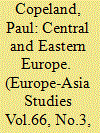

|
|
|
|
|
| Publication |
2014.
|
| Summary/Abstract |
This article analyses the influence and status of the Central and Eastern European states within an enlarged European Union. It analyses two European Union policy negotiations: the Services Directive and the European Union's Financial Crisis Rescue Plan. Central to understanding the influence of a member state within negotiations are its economic size and knowledge of the Brussels policy-making apparatus. Nevertheless, as the new member states from Central and Eastern Europe have gained experience of the European Union policy negotiation process, they remain limited in their ability to influence outcomes. Therefore it can be concluded that while knowledge during negotiations is a necessary condition for successfully influencing outcome, alone it is insufficient because economic weight is particularly pertinent to those outcomes. As a result, the status of the new member states within the European Union is best described as being that of a junior partner, despite the assumed parity of Union membership.
|
|
|
|
|
|
|
|
|
|
|
|
|
|
|
|
| 19 |
ID:
094780
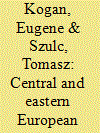

|
|
|
| 20 |
ID:
089891
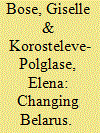

|
|
|
|
|
| Publication |
2009.
|
| Summary/Abstract |
Since the end of the Cold War, European Union (EU) efforts in transforming Central and Eastern Europe (CEE) have been enormously successful. The 2004 enlargement is widely regarded as the single most effective foreign policy strategy in the Union's history, and the recent European Neighbourhood Policy (ENP) was designed to repeat that success in countries located on the EU's new Eastern borders. Although the ENP has been the subject of substantive discussion in European academia, Belarus is the one country in Eastern Europe that has largely escaped scholarly attention.
|
|
|
|
|
|
|
|
|
|
|
|
|
|
|
|
|
|
|
|
|